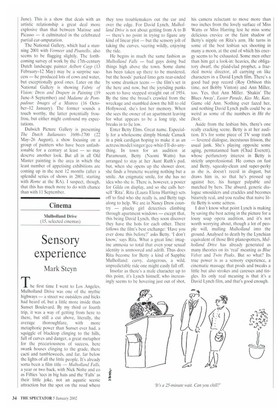Mulholland Drive (15, selected cinemas)
Sensory experience
Mark Steyn
The first time I went to Los Angeles, Mulholland Drive was one of the mythic highways — a street we outsiders and hicks had heard of, but a little more inside than Sunset Boulevard. By my third or fourth trip, it was a way of getting from here to there, but still a cut above, literally, the average thoroughfare, with more metaphoric power than Sunset ever had, a squiggle of blacktop clinging to the hills, full of curves and danger, a great metaphor for the precariousness of success, here swank houses clinging to the grade, there cacti and tumbleweeds. and far, far below the lights of all the little people. It's already sorta been a film title — Mulholland Falls, a year or two back, with Nick Nolte and co as Fifties 'tees in big hats and the 'Falls' as their little joke, not an aquatic scenic attraction but the spot on the road where they toss troublemakers out the car and over the edge. For David Lynch, Mulholland Drive is not about getting from A to B — there's no point in trying to figure any kind of linear plot — but the sensory jolt of taking the curves, veering wildly, enjoying the ride.
He begins in much the same fashion as Mulholland Falls — bad guys doing bad things high above the town. Some dame has been taken up there to be murdered, but the hoods' parked limo gets rear-ended by some drunken teens — the film's set in the here and now, but the joyriding punks seem to have stepped straight out of 1954. By the time the broad's crawled from the wreckage and stumbled down the hill to old Hollywood. she's lost her memory. When she sees the owner of an apartment leaving for what appears to be a long trip, she breaks in to lie low.
Enter Betty Elms. Great name. Especially for a wholesome dimply blonde Canuck in a pink cardigan hoping to make it as an actress/model/singer/gee-whiz-I'll-do-anything. In town for an audition at Paramount, Betty (Naomi Watts) has arranged to stay at her Aunt Ruth's pad, but, when she opens up the shower door, she finds a brunette wearing nothing but a smile. An enigmatic smile, for she has no idea who she is. There is, however, a poster for Cada on display, and so she calls herself 'Rita'. Rita (Laura Elena Harring) sets off to find who she really is, and Betty tags along to help. We are in Nancy Drew country — plucky girl detectives climbing through apartment windows — except that, this being David Lynch, they soon discover they have the hots for each other. There follows the film's best exchange: 'Have you ever done this before?' asks Betty. '1 don't know,' says Rita. What a great line: imagine amnesia so total that even your sexual identity is unmoored and adrift. Thus does Rita become for Betty a kind of Sapphic Mulholland: curvy, dangerous, a wild, unpredictable ride one might easily fall off.
Insofar as there's a male character up to this point, it's Lynch himself, who increasingly seems to be hovering just out of shot, his camera reluctant to move more than two inches from the lovely surface of Miss Watts or Miss Harring lest he miss some delicious crevice or the faint shadow of Betty's nipple on Rita's arm. He turns in some of the best lesbian sex shooting in many a moon, at the end of which his energy seems to be exhausted. Some men other than him get a look-in: heavies, the obligatory dwarf, the plaid-clad prophet, a frazzled movie director, all carrying on like characters in a David Lynch film. There's a good had pop record (Roy Orbison this time, not Bobby Vinton) and Ann Miller, too, Yes, that Ann Miller. `Shakin' The Blues Away', Easter Parade, Kiss Me, Kate. Game old Ann. Nothing ever fazed her, and nothing David Lynch pulls could be as weird as some of the numbers in Hit the Deck.
Aside from the lesbian bits, there's one really cracking scene. Betty is at her audition. It's for some piece of TV soap trash — fevered dialogue, incestuous frisson, the usual junk. She's playing opposite some aging, permatanned ham (Chad Everett), whose perfunctory interest in Betty is strictly unprofessional. He comes on fast and Betty, squeaky-clean and super-perky as she is, doesn't recoil in disgust, but draws him in, so that he's pressed up against her, his hunger palpable and matched by hers. The absurd, generic dialogue smoulders and crackles and becomes bizarrely real, and you realise that naive little Betty is some actress.
I don't know what point Lynch is making by saving the best acting in the picture for a lousy soap opera audition, and it's not worth worrying about, though a lot of people will, mulling Mulholland into the ground. Analysed to death by the Lynchian equivalent of those Brit planespotters, Mulholland Drive has already generated as many theories on its 'real' meaning as Blue Velvet and Twin Peaks. But so what? Its true power is as a sensory experience, a cinematic massage that prods and tweaks a little but also strokes and caresses and tingles. Its only real meaning is that it's a David Lynch film, and that's good enough.






















































 Previous page
Previous page